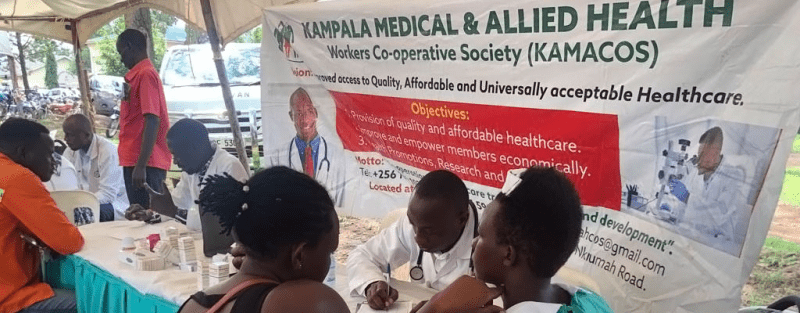
Kampala Medical & Allied Health Workers Cooperative Society (KAMACOS) is a non-profit autonomous organisation that aims to bring together medical professionals and allied health workers for economic development and humanitarian service. It is a non-political and non-sectarian organisation open to all people regardless of race, gender, religion and political preference.
The worker cooperative is the first of its kind in Uganda and was the brainchild of Dr Atuwaire Kagaha Dan, who wanted to create something stable and affordable for himself, medical colleagues and patients after a decade of witnessing poor working conditions as a practitioner. He saw how low income, high business costs for small practices and the inability to provide continuity of care in single settings was frustrating for doctors and patients alike. His solution was cooperation.
In 2017, Dr Kagaha and six other doctors founded KAMACOS alongside the Kampala Cooperative Medical Center (KCMC), with support and training from the Ugandan Cooperative Alliance (UCA). The co-op started making formal consultations in 2018, and KAMACOS now provides comprehensive services to clients, from generic consultations to specific care in a “one-stop centre” such as general laboratory, orthopaedics, dentistry and physiotherapy.
The cooperative now has over 400 members, including doctors, practitioners, and their families, and some external clients, users, and workers. About 40% of the members are women, and the majority in the cooperative are young people (under 35). When joining the cooperatives, members also receive medical insurance, covering the medical care for them and their families paying a monthly premium of 10,000 Ugandan Shilling (around 2.60 EUR).
All members meet monthly, while the board (half of whom are women) meets weekly. Some committees cover day-to-day operations.
Beyond general health, the cooperative aims to improve and empower members economically by encouraging them to engage in other income-generating activities like farming and also to save for investment. KAMACOS also engages in conferences, campaigns, and radio and TV talk shows to create awareness about health.
“Being a cooperative means to give and get quality services. To benefit from each other’s work, and to be self-sustaining,” says Dr Kahaga.
“Being part of a cooperative community allows us to share basic services, reducing the stress of dealing with administrative and management issues singularly. It allows us to balance our professional and personal lives, allowing us to spend with our families and those that we care about. We are now a team and a family.”
Despite challenges like limited equipment and financial constraints, Kamacos continues to support its members and aims to popularise the cooperative model for better healthcare delivery.




